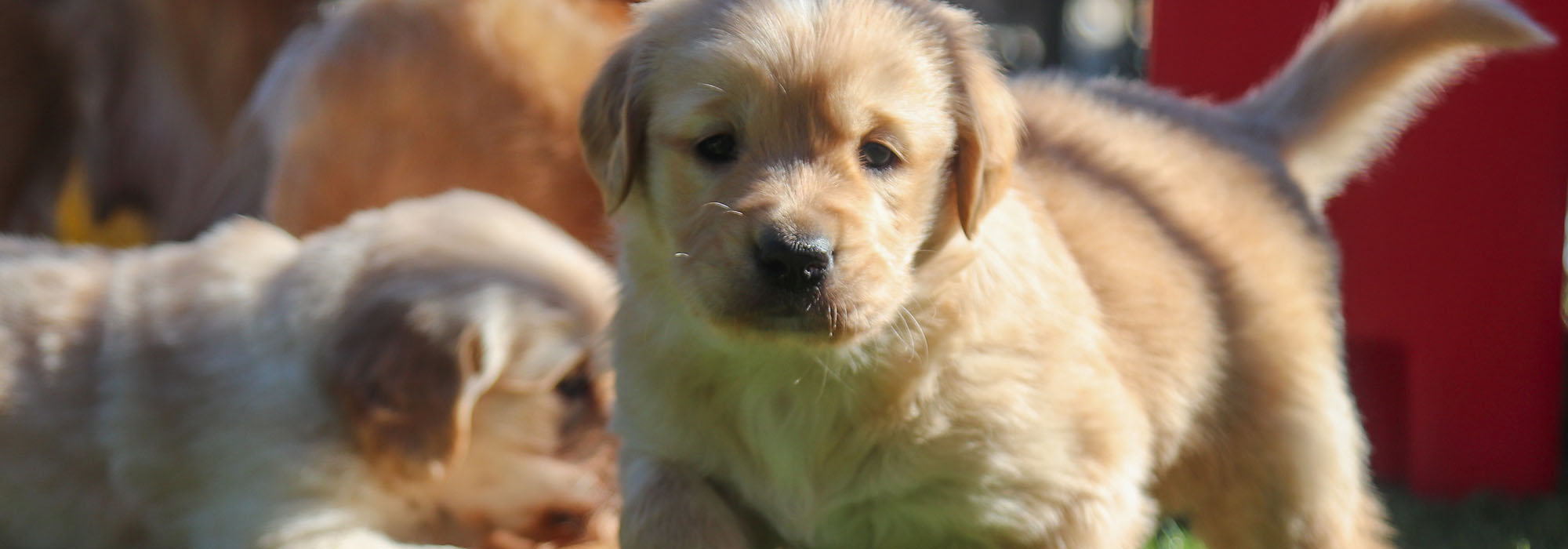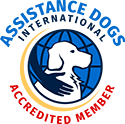
Frequently Asked Questions
So You’re Thinking About Raising A Puppy
What are the requirements to raise a puppy with Guide Dogs of America | Tender Loving Canines?
Prospective puppy raisers must live in Southern California and be within driving distance of a regional puppy raiser group. Puppy raisers must be willing to attend required training classes and monthly group meetings, and must be willing to travel to GDA| TLC’s Sylmar campus for routine medical care and health screenings, kennel acclimation visits and behavior evaluations.
What breeds of dogs are available to raise?
Guide Dogs of America | Tender Loving Canines breeds primarily Labradors and Lab/Golden Crosses. We also breed the occasional Golden Retriever litter.
Can I pick the breed, sex and color of the puppy I want to raise?
We place puppies in homes based on the puppy’s individual temperament and the unique details of the raiser’s home. Our goal is to give each puppy the best chance of becoming a working guide dog, and the right match goes a long way to help create success. A “quiet” puppy will easily be overwhelmed in a bustling household, just as a “busy,” super-confident puppy might overwhelm a first-time puppy raiser. It’s important both the puppy and the raiser are set up for success. We are happy to note personal preference but ask applicants to be flexible when it comes to individual puppy placement. Whether it’s a boy, girl, yellow or black, we promise the puppy breath smells just as sweet!
Can I name the puppy?
Puppy Raisers help name the puppies by suggesting names that follow the assigned litter letter. Names are pre-approved to make sure they are appropriate and aren’t currently in use in the program.
How long will I have the puppy?
Puppies transition into foster homes at 8 weeks old and return to our Sylmar campus when they are about 16-18 months old.
What does it cost to raise a puppy-in-training?
Puppy raisers feed an assigned diet and pay for food (approximately $25/month), flea and tick medication ($10/month) and for whatever toys/supplies they wish to provide for the puppy. Puppy raisers also cover the cost of attending one non-GDA | TLC obedience class (approximately $100-$150).
Can I raise a puppy if I live in an apartment?
Yes! When our dogs go on to become working guide dogs, many of them live with their partners in apartments. So long as the puppy raiser is willing to provide adequate exercise via leashed walks and/or off-leash play in approved, enclosed areas, most puppies do just fine living in apartments. As a renter, be sure to secure your landlord’s permission to have a puppy in your home.
Can my kids be involved in raising the puppy?
Absolutely! Homes with kids provide excellent socialization for puppies-in-training. Raising a puppy with the goal of improving the life of a person who is blind or visually impaired offers many wonderful life lessons for children of all ages. Young children should never be left unsupervised with the puppy, and, in cases where kids wish to be involved in training, a parent or guardian must always be available and willing to assist as needed. Older children often get approval from school administrators to have the puppy-in-training accompany them to school a few days each week, once it’s reached a certain stage of training.
I have other dogs. Can I still raise a puppy? What about other pets?
So long as your resident pets are healthy and behave appropriately around other dogs, yes. In most cases, we prefer to place puppies-in-training in homes with not more than three other resident dogs.
I work full-time. Can I still raise a puppy?
It depends. Our puppies-in-training can’t be left home alone for extended periods of time on a regular basis. If you work outside of the home, you’ll either need permission to bring the puppy to work, or another member of your immediate family will need to participate in the program and commit to caring for the puppy during the day.
Can you help me convince my boss to let me bring a puppy to work?
Our puppies-in-training are insured against liability, and the coverage extends to protect both the puppy raiser and his/her employer. We are happy to help explain the program and issue an insurance rider in your employer’s name.
When can I start taking the puppy out in public?
Our puppies are not fully vaccinated until they are 16 weeks old. As such, we ask raisers to limit their public exposure for the first few weeks. Our canine development team sends each puppy home with a list of training exercises to practice, as well as ideas for how to begin socializing the puppy to new experiences at home and through limited, carefully selected adventures away from home.
Once the puppy is fully vaccinated and gets his training jacket, he can go everywhere with me, right?
Usually. While the goal is to expose puppies to a wide variety of urban environments and unique situations, it’s important to remember not to accidentally overwhelm the puppy with the experience. The puppy and canine development departments will offer guidelines for smart socialization throughout the puppy’s development. In addition, the puppy should also learn how to be left home alone, as even working guide dogs sometimes stay home while their partners go out without them.
I take my other dogs to the dog park and to dog day care. Can the puppy-in-training go, too? What about off-leash hikes, etc?
No. Our puppies-in-training may not visit dog parks, dog day care programs, or similar environments. The puppy may not be off-leash outside of a securely fenced area.
Can the puppy sit with me on the couch or sleep on the bed?
No. Our puppies-in-training must learn impeccable house manners. They are not allowed on furniture, must learn not to jump on the counter or root through trash, and must not dig in the yard. They should sleep in a crate at night, and should also be crated when left home alone. In many cases, when the dogs go on to become guides, their partners introduce “creature comforts” such as snuggling on the couch or sleeping on the bed. However, because we don’t know whether or not a client will allow this, it’s important the dogs grow up assuming such behaviors are not allowed.
What if there is a medical emergency with the puppy?
At the first sign of a suspected illness, puppy raisers should call GDA| TLC’s Vet Department, which is open Monday-Friday from 8 a.m. to 4:30 p.m. GDA | TLC also staffs an after-hours emergency phone, accessible by calling the main number and following the prompts. In the event of a life-threatening emergency, puppy raisers should immediately transport the puppy to the nearest emergency facility and contact GDA | TLC while in route so we can consult with the treating veterinary team and authorize appropriate care. GDA| TLC will reimburse puppy raisers for approved out-of-pocket emergency expenses.
What happens if the puppy doesn’t make it in the training program?
If a dog begins training in our guide dog program and is released, we’ll immediately evaluate the dog for the service dog program. Likewise, if a dog starts in our service dog program and is released, we’ll evaluate the dog for the guide dog program. If the dog is not a candidate for the other training program, or is, but is ultimately released, the puppy raiser is given the option to adopt the dog. Should the raiser choose not to adopt the dog, we maintain a lengthy waiting list of vetted families interested in adopting a released dog. Every dog from our program ends up in a loving home.
What happens when the dog graduates? Will I ever see it again?
When a puppy-in-training successfully completes the program and becomes a working guide dog or service dog, we celebrate the newly formed team during a graduation ceremony at Guide Dogs of America | Tender Loving Canines’ Sylmar campus. As part of the celebration, puppy raisers are introduced to the graduates. Many graduates and puppy raisers choose to stay in contact with each other over the years. Some graduates even ask the puppy raisers to serve as their dog’s “retirement home,” when the working dog retires.
I really want to do this, but I’m not sure I could give the puppy up. How do people do it?
For most people, knowing the dog they raised will empower someone to live with increased independence, confidence and mobility is the ultimate motivation for opening their heart to a dog they know they are not meant to keep. One of our longtime puppy raisers, of many dogs, once explained it this way: “Turn-In Day is no more about ‘giving up’ a dog than sending a human child off to college is about ‘giving up’ the child.” No matter what happens, the puppy you raise will always hold a special place in your heart – and you in his. Click here for a list of upcoming graduation sessions.
Do you have a question not listed here? Call the Puppy Department at (818) 833-6447 or email puppydept@guidedogsofamerica.org.
Thank you for your interest in puppy raising with Guide Dogs of America | Tender Loving Canines. We look forward to working with you!







